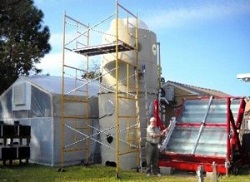 Growing algae for biodiesel seems like a viable option when you consider how oil-rich (and thus, feedstock-rich) the one-celled organisms can be. But while algae is one of the fastest growing organisms on Earth, getting enough growth out of the microbes to make the proposition commercially viable is the holy grail for algae-biodiesel producers. Researchers from AlgaStar Inc. have found a way to increase algae growth rates by 300 percent using a technique called biostimulation and a biomass grower called the SolarMagnatron.
Growing algae for biodiesel seems like a viable option when you consider how oil-rich (and thus, feedstock-rich) the one-celled organisms can be. But while algae is one of the fastest growing organisms on Earth, getting enough growth out of the microbes to make the proposition commercially viable is the holy grail for algae-biodiesel producers. Researchers from AlgaStar Inc. have found a way to increase algae growth rates by 300 percent using a technique called biostimulation and a biomass grower called the SolarMagnatron.
Biological stimulation from electromagnetic fields and/or microwaves offers a novel technology that can accelerate algae growth substantially compared with natural sunlight. Laboratory tests at AlgaStar, Inc. and research collaborators at the University of Western Ontario, (UWO) have proven the biostimulation concept but considerably more research is needed. Additional research efforts are now funded for AlgaStar with Los Alamos National Laboratory. Additional grant applications and research sponsor funding will include Dr. Bruce Rittmann’s lab in the Biodesign Institute at ASU, the world class AzCATI Test Bed at ASU, NanoVoltaics, UWO and others.
The AlgaStar algae production and biostimulation system integrates two types of electromagnetic energy. The first is a millitesla generator and the second a millimeter microwave generator that radiates spontaneous growth energy into large volumes of algae biomass. The research teams have demonstrated that electromagnetic energy waves can provide an increase in algae biomass and its corresponding lipid oil production by up to 300%.
AlgaStar is using it’s patented 4500 gallon SolarMagnatron biomass production system that has an automated biosystem controller (ABC), which optimizes biomass production and uses light very efficiently. During the day, it maximizes natural sunlight, and when it’s night, special domed acrylic lenses and flat-panel glass reactors containing high-efficiency florescent and LED lights produce artificial sunlight at specific wavelengths and power levels that optimize algae photosynthesis.
More information is available on the AlgaStar website.

